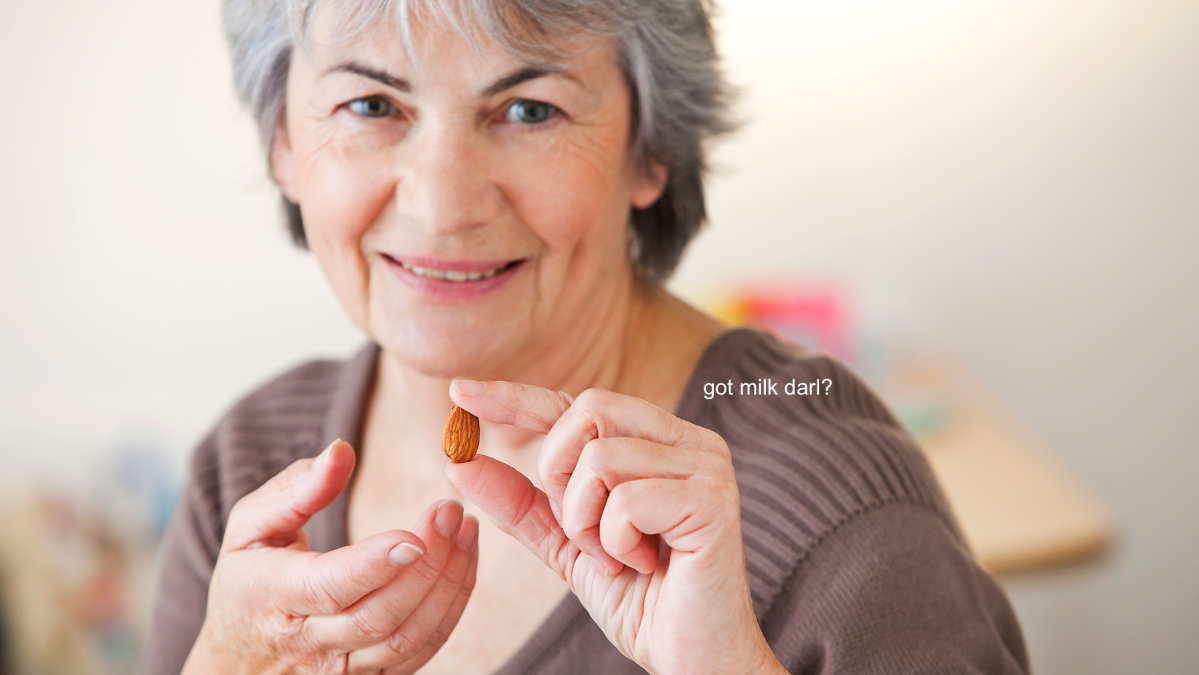
Almond milk is having a real moment.
Everyone I know seems to be drinking it. As I write this, I’m savouring the last sip of an almond latte. Heck, my washing powder is almond milk-scented, partly because it smells good but mainly because I’m a yuppy lil bitch.
Biologically-speaking, almonds don’t have teets, so the sweet nectar is made by blending almonds with water and then straining the mixture to remove the solids.
It’s totally dairy-free but boasts a nutty flavour and creamy texture that’s similar to regular milk, making it a great alternative for vegans and/or dairy intolerant humans who miss milk that tastes like real milk.
What’s more, a cup of almond milk has drastically less calories than a cup of regular cow’s milk.
But according to Dr Michael Mosley, who stars on SBS‘ Trust Me, I’m A Doctor, women in particular should think twice before ditching cow’s milk for dairy-free alternatives.
In an op ed in The Australian, Dr Mosley explained that the drastic shift, especially amongst younger women, towards dairy-alternatives could have serious health consequences.

“There are lots of nutrients that cow’s milk has in abundance that other milks, derived from soya, almonds or oats, don’t. These include calcium, for strong bones, and something that many people rarely consider: iodine,” he writes.
“Cow’s milk is the greatest source of iodine in most Western diets and a move away from drinking it is likely to worsen the already high rates of iodine deficiency.”
In Britain, for example, a country that finds itself in the top 10 most iodine-deficient nations in the world, the largest group experiencing iodine deficiency is young women, which could very well be linked to the rejection of cow’s milk.
So why does an iodine deficiency matter? Short story: it can make you put on weight, give you mood swings, and if you’re pregnant, harm your unborn foetus.
“Iodine is essential for the production of thyroxine, a hormone that controls all the metabolic processes that go on in your body and, in particular, your metabolic rate. Low iodine leads to low levels of thyroxine, which in turn leads to a lower metabolic rate, weight gain and mood swings,” writes Dr Mosley.
“In other words, a lack of iodine in your diet can make you fat (I feel a potential marketing campaign coming on). More worryingly, even mild iodine deficiency in a pregnant woman can have a significant impact on the brain of her developing foetus.”
Ok, so you still love almond milk but want to make sure you’re getting enough iodine. Where can you find it?
Sea veggies are number one.
Kelp, Arame, Hiziki, Kombu, and Wakame are all rich in iodine. If you read those ingredients and have literally no idea what any of them are, that’s cool. They’re types of seaweed.
Kelp has the highest amount of iodine of any food on the planet and just one serving offers 4 times the daily minimum requirement. You can buy it in powder or flake form and sprinkle it over soups or mix it into salad dressing.
Otherwise, those little seaweed salads (wakame) you can buy from most Japanese takeaway joints will do the trick.
If you’re not vegan, greek yogurt can be a ripper source of iodine, with one cup of plain low-fat Greek yogurt containing half your daily iodine and a good whack of protein for a measly 120 calories.
Cranberries and strawberries are also iodine-rich, and double as a serving of fruit, too. Double whammy.
If none of those foodstuffs agree with you, you can get your iodine through supplements.
And if you’re gonna still have your almond milk all day every day, make sure to read the label. Some varieties have only 2% almonds. Others have basically no calcium. To make sure you’re drinking one with similar calcium levels to cow’s milk, check out Choice‘s trusty brand comparison table.
So there you have it, my nutty friends. Now we are all almond-aware, but not almond-alarmed.



